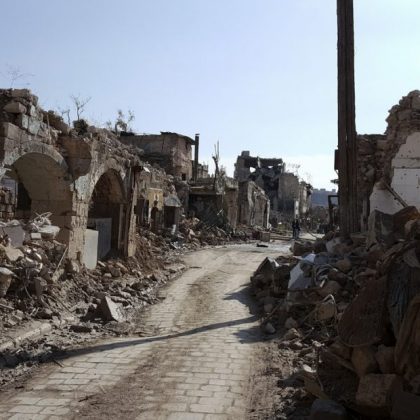Genocide or Natiocide?
On February 24, 2022, the Russian Federation launched an open armed aggression against Ukraine. The main purpose of this so-called “special military operation” is the “denazification” of Ukraine contrived by the Russian leadership.
Immediately, the world was shocked by the atrocities committed by the Russian occupation forces in Ukraine. In particular, Russians committed mass murders, tortured, and raped civilians on the occupied territories.
During hostilities, the occupiers very often resort to prohibited weapons: underwater mines, cluster munitions, high-explosive, phosphorus, and thermobaric bombs. And, having occupied the relevant towns or villages, they kidnap and torture local authorities. Hundreds of thousands of Ukrainian children have been deported to Russia during the “special operation”. More than 450 cultural monuments and numerous works of art have been destroyed or damaged, some of which can no longer be restored. To date, the Office of the Attorney General has recorded and is investigating tens of thousands of war crimes committed by Russian invaders.
Taking into account all these atrocities committed by the Russian troops in Ukraine, the Ukrainian Parliament adopted a Resolution on the Russian Federation’s Genocide in Ukraine on April 14, 2022. It also requested international organizations, governments and parliaments of foreign states to recognize the Russian Federation’s criminal actions as genocide of the Ukrainian nation. It should be noted that the parliaments of Latvia, Estonia, Canada, Lithuania, Poland, the Czech Republic, and Ireland have already responded to this request.
That is, the world community is gradually coming to understanding that one of the most brutal and serious international crimes is being committed in Ukraine, that is genocide.
The provisions of Article 2 of the International Convention on the Prevention and Punishment of the Crime of Genocide of 1948 (hereinafter – the Genocide Convention), define genocide as an act committed with intent to destroy, in whole or in part, a national, ethnic, racial or religious group, including the killing members of the group; causing serious bodily or mental harm to members of the group; deliberately inflicting on the group conditions of life calculated to bring about its physical destruction in whole or in part; imposing measures intended to prevent births within the group and forcibly transferring children of thee group to another group. The concept of genocide is interpreted similarly in the Rome Statute.
It is believed that the actus reus of genocide is usually formed by actions aimed at the physical extermination of members of a certain national (ethnic, racial) group. And actions for the forcible transfer of children from one group to another do not involve direct de facto extermination but have the same goal with a view to the future. The object of genocide is the right of a protected group to existence.
That is why genocide, as presented in the Genocide Convention and ICC Statute, is primarily the physical destruction of members of specific nation, whether within the territorial boundaries of the country of residence of the main nation or outside its borders. That is, the killing of Ukrainians by Russians in Ukraine is quite naturally interpreted by the world as genocide. However, if we assume that the Russians, even without waging an aggressive war in Ukraine, would kill the Ukrainians on national grounds in Russia, this could also be interpreted as genocide of Ukrainians. As both – the first and the second case are about the destruction of a certain protected group.
However, the criminal acts committed by the Russians in Ukraine in many respects correspond to the crime of genocide, but the purpose of their commission, a range of socially dangerous actions, and therefore the objective side (actus reus), as a component of this international crime, will differ significantly from a similar component of genocide.
In particular, having analysed the main theses expressed by Putin in his addresses to the Russian people of February 21, 2022 and February 24, 2022, we find that, as it turned out, there is “…no such state as Ukraine and no such nation as the Ukrainian nation. They do not exist historically. Ukraine is an artificial state without its own history and territory created by communists. Therefore, it (Ukraine) needs to be “decommunized”. What it obviously means –is to be eliminated.
In addition, an article Russia’s Offensive and Coming of a New World in the Russian state-owned media, RIA Novosti, which was scheduled to be published three days after the start of the active phase of armed aggression (just on the date of the referendum results in Belarus), states that “… Russia is rebuilding its unity, destroyed after 1991,… bringing the Russian people together again, and Ukraine will no longer exist… ”. That is, the purpose of the “special military operation” is very clear: Ukraine must be destroyed.
Here, we can also mention the statement of the Deputy Chairman of the Security Council of the Russian Federation Medvedev dated April 5, 2022, or official statements of well-known pro-government political scientists, such as Sergeytsev, calling for the destruction of Ukrainian nation.
We also witness multiple actions, aimed at destroying Ukrainian literature, both historical and fiction, being performed by so-called “ideological units” of the Russian military police. These acts also complement the actus reus of this crime. The decision of the Russian Ministry of Education that Ukrainian textbooks “distort” true history, or the actions of the Investigative Committee of the Russian Federation to initiate a criminal case on the “falsity” of Ukrainian history further complement the actus reus. The Ukrainians in the temporarily occupied territories are forbidden to study in schools in the Ukrainian language.
It is not hard to note that the abovementioned actions, although not aimed at the direct physical destruction of Ukrainians, as is typical of genocide, still pose a significant public danger. They threaten the existence of the whole nation as one of the members of world civilization. A nation not in political sense as a group of people tied by common citizenship, but a nation as a community of individuals who possess a common and unique name, language, religion, culture, history, traditions, folklore and historical Motherland.
Unlike a national, ethnic, racial, or religious group to be destroyed by the crime of genocide, a nation has a much broader sense as object. In fact, each of these groups, both individually and collectively, can form a nation. That is, the object of the encroachment in this case is different from the object of the crime of genocide.
It is especially worth emphasizing that such acts are committed with an intent to implement a separate plan (plot) and are a manifestation of the policy of the Russian state, which is officially called by their authorities “denazification”. It is clearly seen that such a policy of “denazification” in fact is just a cover and has nothing to deal with its historical meaning. By all and any manifestations of that policy, it aims, in fact, to destroy the Ukrainian nation. Consequently, the Russian “denazification”, de facto, is nothing but a deliberate, conscious, and premeditated attempt to destroy another nation. And obviously, in such circumstances, these actions are not fully covered by the already known international crime of genocide. They are aimed at destroying or distorting the unique history of the nation, as well as the destruction or appropriation of cultural heritage, folklore, the destruction of language, which can be a unique identifier of the nation, the denial of the nation’s identity, the deprivation of its own historical territory and statehood as a result of exercising the right to self-determination.
The “destruction of the nation” – this is what genocide primarily meant for its founder, Rafael Lemkin. Genocide, according to Lemkin was not necessary a mass killing of the members of the nation but a “plan of different actions aiming at the destruction of essential foundations of the life of such nations”. “The objectives of such a plan would be a disintegration of political and social institutions, of culture, language, national feelings, religion and the economic existence of national group” –Lemkin wrote in his fundamental work “Axis Rule in Occupied Europe”. Genocide has two phases: one, destruction of the national pattern of the oppressed group and other, the imposition of the national pattern of the oppressor. To describe the destruction of national pattern he used the word “denationalization”. Unfortunately, the further meaning of genocide was substantially narrowed down from its original sense during the drafting of Genocide Convention in 1948. Thus, it placed the destruction of the nations out of the scope of international protection.
Needless to say, all the actions Russians are committing, are dangerous from the point of view of international law, as they encroach on the peaceful coexistence of states, nations and the world order. Therefore, there is a need for their further recording and evaluation so that they can be properly assessed. So, it seems, there is a strong need to single out a more aggravated and more dangerous crime in modern international law, along with the already known genocide, which could be called a natiocide – destruction of the nation. Such criminalization would not only help to condemn Russian authorities worldwide for what they are committing in Ukraine, but it could help the world community to prevent such atrocity crimes in the future and protect nations as unique members of the world civilization.

Volodymyr Pylypenko, PhD in Law, is Associate Professor in the International Relations Department at Lviv University of Business and Law.
Read more on this topic in the Asian Journal of International Law.






